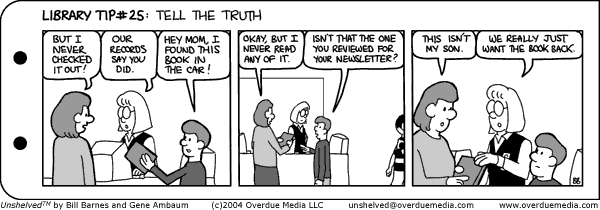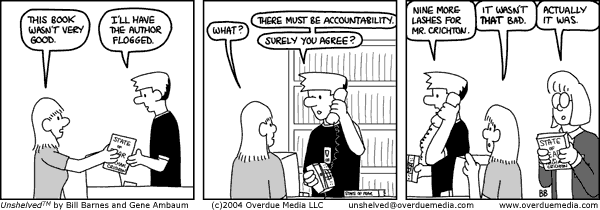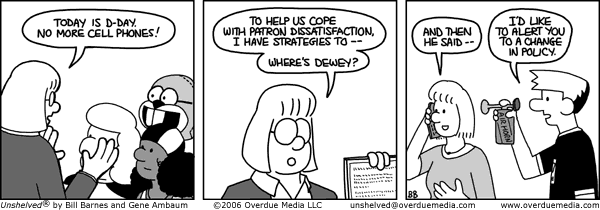September 30, 2006
"Special Interest"
There are web comics for everyone. The more I browse, the more convinced I am that this is the case. Take Wilson for instance, chilling (quite literally, soon) up there at Syracuse, staring approximately 3 decades of higher learning in the face.
For Wilson, there is Piled Higher and Deeper: a grad student comic strip:

Well, soon after I started working at the library, I began to notice a few choice strips pinned up here and there, and eventually I went hunting for the source. What I found was Unshelved, a librarian comic strip. I spent the last week burrowing through the entire archive (4 years of an everyday comic strip is not to be taken lightly, it turns out). I decided to finish the whole thing before adding it to my "Funnies" list over to the right . . . And I just had to share a few of my most favoritest ones. So . . . enjoy, and be sure to "check out" (har!) the rest at your leisure.











September 28, 2006
Quizzage
It's been awhile since I did one of these, and I found some fun ones. Enjoy.
You scored as A classic novel. Almost everyone showers praise upon you for your depth and enduring relevance. According to your acolytes, everything you say is timeless, erudite and meaingful. Of course, none of them actually listen to you. Nobody listens to you at all, but it's fashionable to claim you as a friend. Fond of obscure words, antiquated notions and libraries, you never have a problem finding someone to hang out with. The fact that they end up using you to balance their kitchen tables is an unfortunate side effect, but you're used to being used for others' benefit. Oh the burden of being Great.
Your Literary Personality created with QuizFarm.com |
| Which British Literary Period are you? Restoration 1660-1785--Pope, Swift, Johnson. Times they are a changing. You're very cynical and you like looking out for the little guys. You have a sense of humor a lot of people just don't get. |
| Click Here to Take This Quiz Brought to you by YouThink.com quizzes and personality tests. |
| Orpheus 33% Extroversion, 100% Intuition, 72% Emotiveness, 76% Perceptiveness |
| You are an artist, an aesthete, a sensitive, and someone who has never really let go of that childlike innocence. To you, all of life has a sense of wonder in it, and the story of Orpheus was written about someone just like you. When the Argo passed the island of the Sirens, Orpheus played a song more beautiful than the Sirens to prevent the crew from becoming enticed. When his wife died, he ventured into the underworld to charm Hades but, in his naivete, he looked back becoming trapped there. You can capture your unique world view and relate it to others with the skill of a master storyteller. Your sensitivity and creativity make you a treasure to the human race, but your thin-skinned nature and innocence can cause you a lot of disenchantment and pain. What's doubly unfortunate is that, if you try to lose those traits, you never will, and everyone will be able to tell that you're putting up an artificial shell to prevent yourself from being hurt. Famous people like you: Hemingway, Shakespeare, Mr. Rogers, Melville, Nick Tosches Stay clear of: Icarus, Hermes, Atlas |
 |
September 27, 2006
Someday, Somehow, Some way . . .
. . . I must see this film.
Somehow, as I was jamming through the online catalog for the [Los Angeles film] festival, I just went right past Hot Chicks. But had I been paying closer attention, I would have been almost as enthusiastic as Luke. The screening was of 9 short films, each based on one of what are known as Chick Tracts.
Apparently a few clips from one of the short films can be found here. Further information available from IMDB here. Official site (worth a visit) here, complete with the original tracts, a trailer, DVD purchasing information, etc.
September 25, 2006
The Digest of American Torture
Waterboarding: A Prestigious Tradition (scrolling required)
So, who’s right? Is waterboarding torture, or is it merely a stressful psychological technique?Interestingly, the United States has long since answered that question. Following the end of the Second World War we prosecuted a number of Japanese military and civilian officials for war crimes, including the torture of captured Allied personnel. At one of those trials, United States v. Sawada, here’s how Captain Chase Nielsen, a crew member in the 1942 Doolittle Raid on Japan, described his treatment, when he was captured, (and later tried for alleged war crimes by a Japanese military commission):
Q: What other physical treatment was administered to you at that time?
A: Well, I was given what they call the water cure.
Q: Explain to the Commission what that was.
A: Well, I was put on my back on the floor with my arms and legs stretched out, one guard holding each limb. The towel was wrapped around my face and put across my face and water was poured on. They poured water on this towel until I was almost unconscious from strangulation, then they would let me up until I'd get my breath, then they'd start over again.
Q: What was your sensation when they were pouring water on the towel, what did you physically feel?
A: Well, I felt more or less like I was drowning, just gasping between life and death.
Although Section 1003 applies to the CIA, and some of the "enhanced interrogation techniques" such as "waterboarding"(16) may be outlawed under the legislation,(17) CIA activities remain largely secret and are exempt from new military rules on interrogation when outside a Department of Defense facility (see below). Thus, there is no way of monitoring whether or not they may continue to use interrogation techniques which violate international law.Disturbingly, the legislation included another amendment (section 1005, also known as the Graham-Levin amendment(18)) which curtailed the right of the Guantánamo detainees to federal habeas corpus review and barred them from seeking review by US federal courts of their treatment or conditions of detention.(19) The amendment also allows evidence obtained by coercion (and therefore, possibly, torture) to be weighed for its probative value by the Combatant Status Review Tribunals in Guantánamo. These measures serve to fundamentally weaken the prohibition against torture or ill-treatment by removing key enforcement mechanisms.
The impact of the Graham-Levin amendment was graphically illustrated when the US government recently sought to have a torture claim brought by a Guantánamo detainee before a federal court thrown out. The detainee sought an injunction from a federal judge to ban "extremely painful" methods of force-feeding which included improper use of a restraint chair and heavy nasal tubing, which his lawyers described as "amounting to torture".(20) During the proceedings, government lawyers reportedly contended that even if the treatment breached the "cruel, inhuman or degrading" ban in the McCain amendment, detainees in Guantánamo had no recourse to the US courts on account of section 1005 (above).(21)
"Whoops, I Think You Killed Him": Keeping the Agony Non-Fatal
The American Civil Liberties Union today made public an analysis of new and previously released autopsy and death reports of detainees held in U.S. facilities in Iraq and Afghanistan, many of whom died while being interrogated. The documents show that detainees were hooded, gagged, strangled, beaten with blunt objects, subjected to sleep deprivation and to hot and cold environmental conditions."There is no question that U.S. interrogations have resulted in deaths," said Anthony D. Romero, Executive Director of the ACLU. "High-ranking officials who knew about the torture and sat on their hands and those who created and endorsed these policies must be held accountable. America must stop putting its head in the sand and deal with the torture scandal that has rocked our military."
The documents released today include 44 autopsies and death reports as well as a summary of autopsy reports of individuals apprehended in Iraq and Afghanistan. The documents show that detainees died during or after interrogations by Navy Seals, Military Intelligence and "OGA" (Other Governmental Agency) -- a term, according to the ACLU, that is commonly used to refer to the CIA.
Bodies found in the Baghdad morgue "often bear signs of severe torture", said the human rights office of the UN Assistance Mission in Iraq in a report.The wounds confirmed reports given by refugees from Iraq, Mr Nowak said.
He told journalists at a briefing in Geneva that he had yet to visit Iraq, but he was able to base his information on autopsies and interviews with Iraqis in neighbouring Jordan.
"What most people tell you is that the situation as far as torture is concerned now in Iraq is totally out of hand," the Austrian law professor said.
"The situation is so bad many people say it is worse than it has been in the times of Saddam Hussein," he added.
"The Bush Administration has adopted exactly the right posture on the matter. Candor and consistency are not always public virtues. Torture is a crime against humanity, but coercion is an issue that is rightly handled with a wink, or even a touch of hypocrisy; it should be banned but also quietly practiced. Those who protest coercive methods will exaggerate their horrors, which is good: it generates a useful climate of fear. It is wise of the President to reiterate U.S. support for international agreements banning torture, and it is wise for American interrogators to employ whatever coercive methods work. It is also smart not to discuss the matter with anyone."[17]This appears to be exactly what the Bush Administration did. "We now know that at the highest levels of the Pentagon there was a shocking interest in using torture and a misguided attempt to evade the criminal consequences of doing so," said Human Rights Watch executive director Kenneth Roth. But, Roth added, "[i]f [the Pentagon's] legal advice were accepted, dictators worldwide would be handed a ready-made excuse to ignore one of the most basic prohibitions of international human rightslaw."[18]
Legal Advisors Say Torture "a Go"
Torture is allowed as part of President Bush’s "ultimate authority" as commander in chief, and neither treaty obligations nor existing congressional statutes can stop him (or those acting on his orders) from torturing if he believes it is necessary. That’s what two high-level legal memoranda prepared by the White House counsel and a special Defense Department working group have concluded.
Meet the Killjoys: Kimmons Edition
I am absolutely convinced [that] no good intelligence is going to come from abusive practices. I think history tells us that. I think the empirical evidence of the last five years, hard years, tell us that. . . . Moreover, any piece of intelligence which is obtained under duress, through the use of abusive techniques, would be of questionable credibility, and additionally it would do more harm than good when it inevitably became known that abusive practices were used. And we can't afford to go there.Some of our most significant successes on the battlefield have been -- in fact, I would say all of them, almost categorically all of them, have accrued from expert interrogators using mixtures of authorized humane interrogation practices in clever ways, that you would hope Americans would use them, to push the envelope within the bookends of legal, moral and ethical, now as further refined by this field manual.
We don't need abusive practices in there. Nothing good will come from them.
Meet the Killjoys: Powell Edition
I just returned to town and learned about the debate taking place in Congress to redefine Common Article 3 of the Geneva Convention. I do not support such a step and believe it would be inconsistent with the McCain amendment on torture which I supported last year.I have read the powerful and eloquent letter sent to you by one my [sic] distinguished predecessors as Chairman of the Joint Chiefs of Staff, General Jack Vessey. I fully endorse in tone and tint his powerful argument. The world is beginning to doubt the moral basis of our fight against terrorism. To redefine Common Article 3 would add to those doubts. Furthermore, it would put our own troops at risk.
I am as familiar with The Armed Forces Officer as is Jack Vessey. It was written after all the horrors of World War II and General George C. Marshall, then Secretary of Defense, used it to tell the world and to remind our soldiers of our moral obligations with respect to those in our custody.
September 24, 2006
More Than Just a Fiction
Trolling through Arthuriana (The Journal of Arthurian Studies) on an unrelated quest the other day, I came across this gem. I was reminded again how stringently I object to the popularity, premise, supposed appeal, and general lack of quality that make up The Da Vinci Code craze. And I was reminded of how equally annoyed I am by those who found it necessary to go out and generate further interest in the pulpy stuff by stirring up controversy (i.e. dignifying it with religious objections) and publishing entire books devoted to the deconstruction of Brown's cooky borrowed theories.
Norris Lacy (Professor of French and Medieval Studies at Penn State) does a more than adequate job in a mere 13 pages (counting endnotes!) and maintains an admirable detachment from the sort of pro- or anti-Christian agenda that gets under my skin the most in debates such as these. He also provides a quite satisfactory answer to the question of whether it is silly to complain so heatedly about a novel, a work of fiction. I've been idly searching for just such an answer ever since we discussed the book in our Grail class last semester.
Anyway . . . a highly enjoyable read for those of us who were irritated (particularly if they weren't quite sure why) by the book, and a highly informative read for anyone who wants to know what our problem is.
September 15, 2006
A Fantasy Masterpiece of British Proportions
Every so often a book comes along that just blows me away simply because it does something that I've never seen before, and does it well. Jonathan Strange and Mr. Norrell by Susanna Clarke is just such a book. The first title by this author, it is a massive tome nearly 800 pages long. The story juggles an enormous but memorable cast of multi-dimensional characters and dazzlingly interweaves a dozen intriguing plot threads.
The genre, if it must be defined, is historical fantasy. The novel begins in England in 1806. Magic, once an everyday part of English life and culture, has (to all appearances) disappeared from England entirely. Modern-day magicians are gentleman-scholars who study and write books about magic and its history, but who do not possess any actual books of magic, and do not under any circumstances practice it.
Two members of the The Learned Society of York Magicians, Mr. Segundus and Mr. Honeyfoot, are determined to discover why magic has fallen out of use. Their investigations bring to light the fussy, reclusive bookworm Gilbert Norrell, owner of the largest magical library in history (which no one knew existed) and the only practicing magician England has seen in over a hundred years. Mr. Norrell bursts spectacularly on the national scene when he brings the statues of York Cathedral to life before proceeding on to London to offer his services to the government in the ongoing Napoleonic Wars.
Before long a second practical magician emerges from the woodwork to become Mr. Norrell's apprentice. He is Jonathan Strange, a fiery, intelligent young man who is everything Norrell is not. Where Norrell is cautious and fearful, Strange is brave and impatient. Where Norrell's magic comes only from his books, Strange has an uncanny grasp of the basis of magical theory, and can improvise many of his own spells. And where Norrell is outspoken in his loathing for all things connected with fairy magic, Strange finds himself strangely drawn to fairy lore.
In particular, Strange is fascinated by anything to do with John Uskglass, a human child raised by fairies who emerged from Faerie to become the greatest magician in history. Uskglass established the very foundations of English magic and went on to rule northern England for 300 years during the High Middle Ages before mysteriously disappearing with the promise to one day return and reclaim his throne.
Of course, before long, Strange and Norrell's differing magical philosophies cause relations between the grow increasingly tense, while, unbeknownst to either of them, a unpredictable, sinister force has been awakened and is working mysteriously behind the scenes to ruin both of them.
The novel, however, is far from following the above summary with simply, straightforward storytelling. The entire story is peppered liberally with footnotes containing further fascinating information on the rich and convincing alternate history Clarke has created for England in the form of charming anecdotes, references to magical texts, and explanations of spells and the like.
Clarke draws on a more-than-ample heritage of all things British to create her book. Many of her characters could easily be the beloved creations of Austen, Dickens. Her humor is as dry and hilarious as anything by Shaw or Wilde. Her ability to create new worlds and the originality of her fantasy bring to mind the best of Tolkien, Lewis and Rowling. Her story is as historically grounded and engaging as anything by O'Brian (to name something set in the same period). Her social commentary is as witty, appealing, and incisive as Forster's. Her alternate history and fairy lore are drawn from a vast melting pot of some of the best elements of British folklore and fairy tales, the Arthur legends, and a few bon mots from Shakespeare and Spenser for extra flavor. Her characters encounter and influence history without severely altering it, heightening the realism, and the major historical players who have important roles in the book include figures like the Duke of Wellington and Lord Byron.
In short, Susanna Clarke has written a unique book and populated and enlivened it with the best and brightest that British culture, history, literature and mythology have to offer. If matters of Britain appeal to you, or you enjoy storytelling that pulls you inside another world where you can happily spend hours on end, you should probably give Jonathan Strange and Mr. Norrell a try. If you love both, you owe it to yourself to pick up a copy.
And now I should really end this particular review, lest I succumb to the overpowering temptation to quote long passages. Still, perhaps just one minor quote wouldn't hurt:
A lovely young Italian girl passed by. Byron tilted his head to a very odd angle, half-closed his eyes and composed his features to suggest that he was about to expire from chronic indigestion. Dr. Greysteel could only suppose that he was treating the young woman to the Byronic profile and the Byronic expression.
Now, go forth. Read.
September 12, 2006
My Letter to LeTourneau (Updated)
*** Update ***
Yesterday evening I got a reply from Corey, who wound up with my e-mail. Having said that, it is almost redundant to confirm that the response was more than satisfactory. He replied respectfully to every part of my message, promised to get Rachel 4 free meal vouchers, and agreed with me and all of you in condemning the response to Rachel's original request for compensation.
He also encouraged me to be a little less . . . Well, you all saw the original e-mail, and I don't think I need to go through it with you and point out where I was fair and justified and where I was just ranting, generalizing, and taking cheap shots. However, having thanked him for all his help and promised to give a more moderate approach due consideration, I do still feel that my experiences as a student have shown me a side of LeTourneau that won't allow some occurrences to be dismissed on the grounds that those involved "have good intentions" or "want what's best for the students." So, I expanded my reply a bit with the following:
Now, as to the general tone throughout my e-mails . . . The second in particular was (obviously) composed in some haste and sent impulsively. I tossed out a general reference or two that had no place in the e-mail at all if only because of sheer irrelevance. As for the first message, had I known for sure that it would go to you, for instance, it would have been a very different e-mail because I know I can get a fair hearing and a real answer without abrasively demanding one (and I can avoid a lot of background, since you know me). Of course, whether or not my tone should ever be abrasive and demanding, regardless of the circumstances, is a good question.
Nevertheless, I am certainly aware that no employee is setting out to do a bad job, and that there are many who care deeply about the students. Without naming names, every student who has been around long enough knows the people they can go to who will do their best to resolve any problem and who will treat the students as equals in the meantime. And we also know who will be unhelpful and condescending, with responses ranging from glib and dismissive to simply curt and dismissive. Unfortunately, there are quite a number of them as well, and they occupy very important positions.
I don't know what response I would get from them in return for abrasive demands (probably a less than satisfactory one, I grant you), but I do know from past experience that politely sincere inquiries are generally met with a demeaning brush-off. Four examples of which I have personal knowledge come immediately to mind just from the past year where LeTourneau's response to something left me simply appalled.
Side-note: I didn't include any of the examples and I wrapped up the e-mail from there. However, the incidents I had in mind were:
1) In a meeting with Dr. Austin, I explained quickly but in detail the problems faced by LeTourneau history majors thanks to a very clearly inadequate number of staff members (two), rendering the major as offered by LeTourneau inferior both in terms of academic value (considering what we pay for it) and in comparison with other Universities. I didn't put it in quite those terms, I simply tried to express our rather desperate need for additional faculty. His response: "Well, accrediation only requires one history professor, so we're already exceeding that." That was it. A twelve-word response which made it exceedingly clear that his interest in the quality of our education was no deeper than his desire to make the University look good. When mediocrity brings success and acclaim, why strive for excellence, right?
2) Rachel paid a visit to the school nurse (yes, she actually found her . . . and I think she might even have been in her office at the time, but don't quote me on that) in need of medication for some sort of ailment (many of the finer details of this incident evade me at this precise moment, I'll confirm them with her later and flesh this out). The nurse, having been made aware of Rachel's asthma, the other medications she was on, and the nature of her ailment, gave her a bottle of pills to cure it. Walking out, the first thing Rachel noticed on the bottle was something to the effect of "People with asthma SHOULD NOT take these!" The entire incident raises an interesting question: When you go questing for the school nurse (no other verb adequately describes it), is it healthier not to find her?
3) As all LeTourneau students know, last semester Gary Holeman decided to impose an internet bandwidth cap of 3 GB per month on University students (if anyone jumps in with "it's not a cap!" I will stab you in the face). He was interviewed by the campus newspaper about the details surrounding said cap, and one of the questions pertained to what would happen if the limit were exceeded. Holeman's response (I should really dig for the exact quote, but most of you will remember) boiled down to pinching the offender's internet down to the equivalent of a bad modem connection. He concluded (and I paraphrase), "If someone goes over, I want them to really feel the consequences." The entire sentiment expressed here was so distressingly petty and vindictive. It was clear that Holeman regarded the cap as a punishment on evil people who would dare to use more than 3 GB in a month. Students pay a lot of money for our internets, you'd think we could use them without drawing down the wrath of an angry IT.
Holeman went on to whine in a most immature and childish fashion in the very next issue of the paper, saying that his words had been mischaracterized, that "it's not a cap, it just limits your internet" or something retarded like that, and that he was disappointed in the writers over a graph comparing LeTourneau's download limit to that of other schools (shockingly, LeTourneau was on the extreme low-end of the scale). Personally, I think he just felt betrayed because he was laboring under the false impression that the YellowJacket was a propaganda rag. Incidentally, having lived on-campus during the cap for the past 4 months, I have not noticed that the internet is much faster or better than it was before. However, on August 31st, I bled over my 3 GB by a couple of megabytes, and let me tell you, I felt the burn. Bravo, Mr. Holeman. I am completely ashamed of myself and I won't let it happen again.
4) Early last Spring someone (for God only knows what reason) stole the toilet paper dispenser out of the Village Center bathroom. Subsequently the bathroom was locked for about 2 months (supposedly out of order). This bothered me consistently for weeks until finally I went up to MSC-2 to inquire about it. As I recall, I presented the situation to Corey and asked when we could have our bathroom back. He thought that sounded reasonable enough and called Brad Bowser out and asked him about it.
I don't remember Bowser acknowledging my presence at all during the exchange, but he pretty much killed the idea of unlocking bathroom on the spot, and added words to the effect of "If they can't keep from vandalizing their bathroom I don't see why we should open it up for them." It was at that point that I realized that Bowser didn't regard the bathroom as out of order at all, but that we had been without the use of it for 2 months because we were being punished for something that anyone on campus (or, in fact, in south Longview) could have done. To paraphrase Bowser: "Oh, we can't have nice things!" The VC bathroom eventually reopened, but as of when I was last in there a few weeks ago, the toilet paper dispenser still had not been replaced.
I think each of these instances shows a level of incompetence, self-absorption, or lack of respect for students which is quite worthy of a diatribe in its own right. However, I've posted and purged myself of bitterness for the time being. I'm grateful for people like Corey that keep LeTourneau from resembling its more conservative and authoritarian bretheren. If anybody has any further fuel to throw on the fire (or water to put it out) feel free to toss in your two cents. I'm done for now. Any further dialogue with Corey will continue outside of the blog.
The original e-mail is beneath the fold.
_________________________________________________
I'm not sure where this e-mail ought to be directed, exactly. I am not totally familiar with the structure of Student Affairs, and I hear that there has been a bit of a fruit basket turnover with various positions recently, rendering the directory on LeTourneau's website inaccurate. I hope you can see that this e-mail gets to the right person or people.
My name is Jared. Last spring I graduated from LeTourneau after attending for four years. In late May, I moved into apartment 1D with Rachel Gullman, who has attended LeTourneau for three years (this is her last year). For the current academic year, Rachel wanted the same meal plan she'd had the year before (13 meals and a certain amount of flex money). However, when she requested it, she was told that somehow, by moving closer to both SAGA and the Hive and joining the married students (a group which has their own RA, RD, chaplain, and senator and which is at least the size of any residential floor on campus) she has become (of all things) a commuter.
This seemed extremely silly, for obvious reasons, but when she asked why this was the case, she was told it is because LeTourneau has no breakdown for precisely how much a meal plan costs by itself. This was so obviously a ridiculous statement (even in comparison to the random application of commuter status) that I immediately wondered what the price breakdown could show which would prompt the administration to bury it.
However, policy is policy and at the time it hardly seemed worth arguing about. Rachel had a refund of several hundred dollars on her student account, and she requested that the "lunch every day" meal plan be paid for out of that. (Funny how there is no problem computing the cost of 5 meals a week, but figuring out 13 meals a week is beyond LeTourneau's ability.) The transaction was approved and she has lunched with no problem for the past two weeks or so. Today, however, when we went to the Hive at about 1:30, Rachel's card was refused. She was told that she could have no food until the problem was fixed in SAGA. At this point, my lunch break was nearly over and I had to get back to work, so I left Rachel to get the problem fixed at SAGA and hopefully get herself some food.
The people at SAGA sent Rachel to MSC-2. The people in MSC-2 sent Rachel back to SAGA. The people in SAGA sent Rachel to Student Accounts. The people at Student Accounts told Rachel to go back to SAGA, at which point she realized that she had wasted over an hour being given the grand runaround through the hot summer sun due to a complete lack of interdepartmental communication. After she told the people at the Business Office what had happened, they told her that their system was down and to come back in 15 mintues. At this point SAGA was long closed and all hope of getting lunch was gone.
She returned after 15 mintues. The system was still down. She was told she would be called when it was back up, but didn't receive a call until a few minutes before the offices closed. The error (of course) was a clerical one within the LeTourneau system, and it is to be hoped that Rachel's meal plan will be available to her again by lunchtime tomorrow. However, tired, hungry, and sweating, Rachel had asked hours earlier if she could somehow be given a voucher or some other form of refund for the meal she had missed due to a system glitch that was in no way her fault. She was told that "It is not worth it to us to refund the meal."
To summarize: As an "on-campus commuter" (the term makes me laugh, much the way "separate but equal" does, but somehow that's what Rachel is) Rachel is given a patently false reason for why she can't purchase as many meals as "normal" students can. Within two weeks of school starting she is denied a meal due to a problem with her card; a problem which neither of us once encountered during our 7 combined years at LeTourneau as "normal" students. The perennial problem (which rivals my experiences of third-world bureaucracies for sheer incompetence) of LeTourneau's inability to communicate between departments sends Rachel on an outrageous wild goose chase which costs her a meal (which did cost us a calculable amount of money, despite LeTourneau's supposed difficulties with the numbers involved). A LeTourneau employee, representing the attitude of the University towards its students (and paying customers), declares it "not worth it to [the University]" to refund payment for goods and services never rendered due to an error made by said University.
Every student I know has some story of a similar incident that took place at some point during their time here; an incident where it suddenly became very clear that the policy-makers at this school are a lot more interested in taking our money than they are in making sure we have a fair return on it. I have a few of these stories myself. So does Rachel. College students are young and new at fending for themselves, and it is pretty easy for the University to pull stunts like these. I never really bothered to complain before because 1) the attitude of the University seems to indicate that giving student complaints fair consideration has an extremely low priority, and 2) I wasn't really interested in getting in a tussle with the people who had ultimate power over my degree. But in this case, we'd kind of like the meal we paid for (despite the University's apparent lack of concern) . . . and maybe (although I don't expect it) the real reason why married students are only eligible for commuter meal plans.
Sincerely,
Jared
P.S.
Rachel was sent this morning by Student Accounts back over to SAGA to get her card reactivated. At SAGA she was told she would have to talk to someone named Sara, who was supposedly in the back. She never showed up, and after waiting for some time Rachel had to go to class and couldn't wait anymore. It just so happens that by a strange coincidence, I know where Sara was. She wasn't on campus at all. I work at the Longview Public Library, and I happened to notice her there today at around the time when Rachel was waiting for her in SAGA. Rachel returned to SAGA later, only to be informed that her card had been activated all morning, even before she was sent to SAGA in the first place. Once again she had had her time wasted for nothing, not to mention the stress of not knowing what she was going to do for lunch.
How does anything ever get done at all on this campus? Nobody ever seems to know what's going on with anything anywhere at any time, and the people who supposedly do know are always AWOL. It's like trying to find the school nurse.
